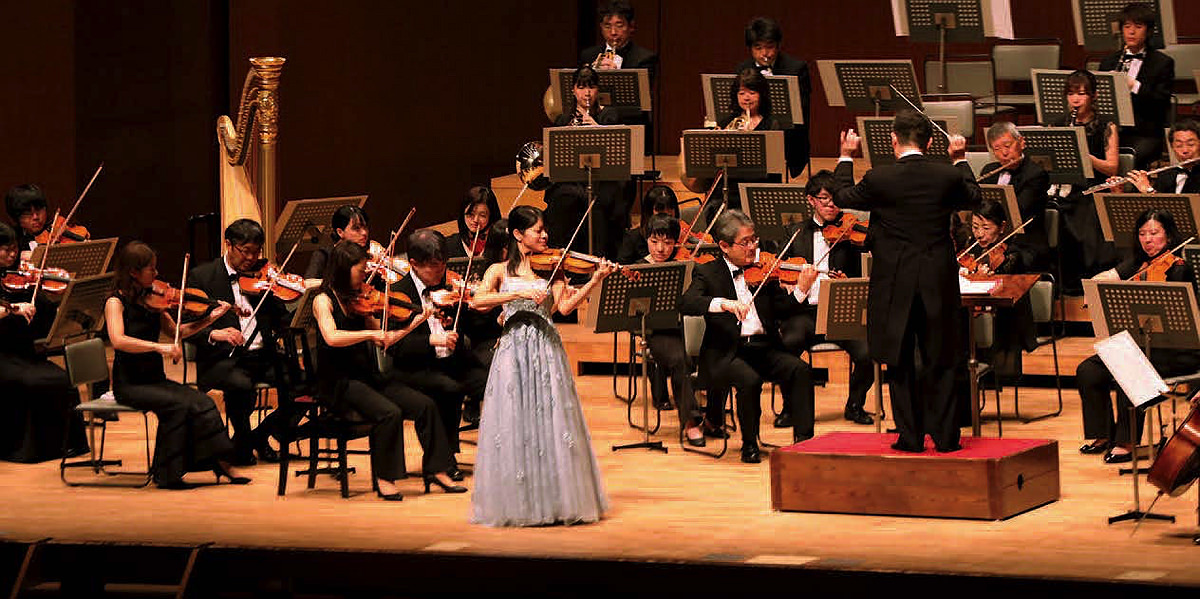Sumire Hirotsuru ’16 doesn’t think much about what she’ll be doing next week. She knows that future obligations exist, but they generally remain an abstract concept housed in her Google calendar. She’s focused on the task at hand. Now, she needs to get to sleep. She’ll wake up in a few hours, hop into a car, and head toward Tokyo’s TV Asahi headquarters for her recurring role as on-air co-host, appearing on millions of Japanese screens, riffing on current events. Minutes later, she’ll be back in the car, on the way home. On to the next task.
Hirotsuru has long remained committed to not having a plan. She prefers to work in frenetic bursts under unwavering deadlines. “I’m such a Type A person,” she explains. “If I plan for a long-term goal, I might say no to fun short-term opportunities.” This improvisatory attitude has led to a unique career. She is a touring violinist, author of three books, university lecturer, and a weekly television commentator. In the deeply traditional field of classical music, Hirotsuru draws inspiration from all of her experiences. She wants to play well, but most of all, she wants to entertain.
She was born in Oita, Japan, a coastal city on the southern island of Kyūshū, and began playing violin at the age of three. Her parents didn’t play instruments, but they loved music and filled the house with CDs. Much of Hirotsuru’s early training came from playing her favorite recordings by ear. “I didn’t know any string players around me,” she says, “so I was always competing with the CDs of great violinists—Itzhak Perlman, Midori, Jascha Heifetz.”
During middle school, she began flying to Tokyo twice a month for lessons. Her career took a turn in high school when she won the 2009 IBLA Grand Prize Music Competition, held in Ragusa Ibla, a city in southern Sicily. While most competitions include strict rules on instrument, age, and repertoire, this one encouraged unique programs on any instrument—played in a wide range of venues. Hirotsuru remembers performing for crowds who watched attentively while eating pasta. They seemed to like her, and she won. Her reward was a featured tour across the United States, ending at Carnegie Hall.
Though she hadn’t imagined leaving Japan for college, she stopped at Princeton and Harvard on her tour and liked how fervently students pursued extracurricular activities. She decided to apply to Harvard the following year. To learn the 15,000 vocabulary words, she needed for English proficiency exams and the SAT, she picked up a habit she would later detail in her first book, Supercharged Self-Management. She chose 50 words, set a timer for five minutes, and focused wholly on learning them. She repeated, as needed, thousands of times.
Hirotsuru was too overwhelmed at Harvard to experience culture shock. Upperclassmen recruited her for numerous ensembles: the Harvard-Radcliffe Orchestra, Brattle Street Chamber Players, pits for musicals, student performances, an orchestra that played video game soundtracks. Her musical range came in handy during her junior year when the director of the Silkroad Ensemble heard her play and asked if she knew styles other than classical. A few days later, the Dunster House resident was invited to perform with the group headlined by Yo-Yo Ma ’76, D.Mus. ’91.
Silkroad’s rehearsals shifted her approach. Ma laughed and joked throughout, and musicians talked not just about phrasing and dynamics but about the story and philosophy they wanted to share with the audience. “I never thought about music in that way before I played with him,” she says. “I always thought, ‘Okay, I have to get notes right. I have to play well. I have to do the correct things.’ But that performance together was completely different.”

For Hirotsuru, shown here performing after her Juilliard graduation in 2018, everything circles back to music.
Photograph courtesy of Sumire Hirotsuru
After Harvard, Hirotsuru applied to Juilliard (employing her five-minute method while preparing audition repertoire) and got in. She invested fully in chamber music there, cofounding a quartet and fundraising for a tour to Canada and Japan. Right before graduation in 2018, she received an inquiry from a Japanese TV station that wanted to highlight her experiences at Harvard and Juilliard. The next week, at her graduation, a film crew showed up. They were fascinated by her credentials, she said, and found it interesting that she was pursuing violin. “After graduating from Harvard, they naturally think you will work for a prestigious company and make tons of money,” she says. “But I was not.”
When the special aired, a literary agent reached out to see if she wanted to write a book. She thought it could be fun, so she said yes. “Because I was writing about the five-minute method,” she jokes, “I felt the pressure to really follow the rules.” She also started her own company, Smilee Entertainment. Her experience in a video game orchestra and her College music concentration led to a job writing the soundtrack for a Paralympic video game. Her leadership of an English-learning summer program in Japan and fundraising led to inquiries for her services in artistic management. The success of her first book led to two more. When she moved to Tokyo during the pandemic, her growing reputation led to invitations to co-host a popular morning television show and to teach college; she has taught courses from “violin ensemble” to “Topics on Business and Economics.”
But for Hirotsuru, everything circles back to music. “What makes me most excited,” she says, “are violin performances.” Her experience on TV brings her more opportunities to perform solo recitals and concertos with orchestras across the country. It’s also pushed her to think more about the audience perspective. She remembers a television producer telling her before a live violin broadcast that having her eyes shut conveyed little to the viewer. “Some musicians hate that,” she says. “They don’t want to compromise for those occasions.” She doesn’t feel like she’s compromising, though. Even in her own life, she says, “I can’t listen to a whole symphony sitting down.” She listens to a lot of J-pop and jazz and thinks the different influences contribute to her own unique voice. If there’s a way to make her art more entertaining, she wants to try it.
When preparing for solo performances, Hirotsuru still plays along with recordings as she did in her youth. She works out a few passages, fiddling with rhythms until a tricky set of notes falls naturally under her fingers, but she’s more focused on the overall presentation. She likes doing full, private run-throughs, including the obligatory pre-performance bow. Is her sound clear and articulate? Does a half-hour piece sound unified? She prepares for the short talks she’ll do between pieces when she’ll share their stories and her reasons for choosing them—just as Yo-Yo Ma did. She’ll entertain with everything she has, not quite knowing what she’ll be doing next. “The only long-term goal I have,” she says, “is to play violin until I die and to reach as many people as possible.”








